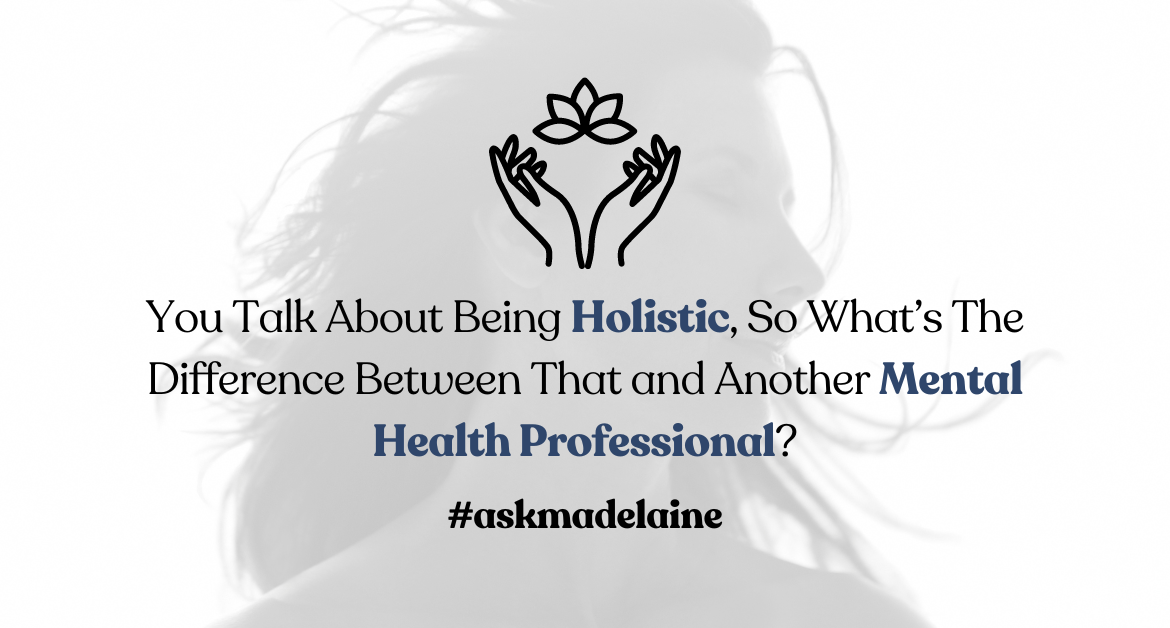

You Talk About Being Holistic, So What’s The Difference Between That and Another Mental Health Professional?
Ah, this is a question I often encounter, and it’s a great one! As I’m not sure if this question comes from a health professional, someone interested in becoming one, or a potential client, so I’ll answer in a way that serves you either way. Let’s delve into it.
Welcome to #AskMadelaine, where we fearlessly explore the questions swirling in your mind about life, the world, and our very existence. Have a burning question for Madelaine? Share it with us at info@madelainevallin.com, using the subject line “Modern Visdom” (not misspelled – it’s Swedish for wisdom). We can’t wait to hear from you.
So, what exactly sets holistic approaches apart from more conventional methods in mental health? Well, it all boils down to the depth of understanding and the approach we take in supporting individuals.
When we talk about being holistic, we’re essentially considering the whole person—not just their cognitive aspect or belief system, but delving deeper into various layers of their being. Personally, I operate within a framework I have developed called the four levels of transformation when working with my clients. This is the same framework we teach at the Australian School of Holistic Counselling (I’ll add a link to another article at the end of this post if you want to look further into this framework).
The first two levels primarily focus on cognitive aspects—beliefs, values, perceptions of the world. While conventional mental health approaches often centre around these aspects, I’ve found that delving into deeper layers is essential for comprehensive healing.
Moving into the third level involves tapping into our inner knowing—connecting with the deeper essence of who we are beyond our emotions and thoughts. And finally, the fourth level, known as deep knowing, involves connecting with something greater than ourselves, often referred to as spirituality.
This framework guides my work with clients, helping them explore these layers and find new meaning and purpose in their lives. At the Australian School of Holistic Counselling, we delve into these levels extensively to equip counsellors with the tools to support clients holistically.
Now, in contrast, conventional mental health approaches tend to focus more on the cognitive mind, beliefs, identity, and the client’s story. While addressing these aspects is crucial, delving into deeper layers is equally vital for long-term healing.
Another key distinction lies in the clinical versus non-clinical approach. Holistic counselling operates outside the clinical scope, which means we don’t treat mental health disorders or analyse clients. Instead, our focus is on helping clients discover their true selves in a client-centred manner.
We refer to our clients as clients rather than patients, emphasising their wholeness and the belief that there’s nothing inherently wrong with them. My approach revolves around helping clients access their innate wholeness, facilitating natural healing.
It’s important to note that both holistic and conventional approaches play crucial roles in supporting individuals on their healing journey. Each approach brings its unique strengths to the table, but what truly matters is finding the right fit for the individual’s needs.
🌿 I Frid, Madelaine
RELATED ARTICLES:
PLUS – Whenever you’re ready, there are 2 ways we can work together:
- Sign up for one of our current courses at ASHC and get taught by my team of advisors and me. All our courses are internationally and nationally industry approved and will equip you with all the tools to open up your own professional private practice.
- Apply for 1 of only 3 spots as my private client. Mentorship for Holistic Mental Health Practitioners (1), Mentorship for High Performers (2).

